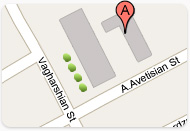
“Knowledge Graph” by Google
 Official launch of the "Knowledge Graph" was held on 16 May - the move to the new search algorithm. Google fundamentally
changes the way of his search results, leaving from the processing of keywords
based on relevancy, so it passes to semantic search results. With
this new algorithm search engine will understand
the meaning of the search word. The start
of this evolution was the "Knowledge
Graph" by Google. Over the
next few days, this feature will be available for all users.
Official launch of the "Knowledge Graph" was held on 16 May - the move to the new search algorithm. Google fundamentally
changes the way of his search results, leaving from the processing of keywords
based on relevancy, so it passes to semantic search results. With
this new algorithm search engine will understand
the meaning of the search word. The start
of this evolution was the "Knowledge
Graph" by Google. Over the
next few days, this feature will be available for all users.
The "Knowledge Graph" enables you to search for things, people or places that Google knows all and instantly get information that's relevant to your query. Typing a query into the search bar Google, in the first issue you receive instantly some blocks of results with all the possible variants of answers to his request. For example, a user asks Google for information about the Taj Mahal, he/she gets to issue three sets of answers:
- in the main list of results - all the articles about the mausoleum-mosque
- in a separate upper block to the right - the data on the location, height, year of foundation, architecture and the architect of the Taj Mahal
- in the lower right block - links to move to the results of issuing requests 1) a musician, which is of an alias Taj Mahal, and 2) an American casino with the same name.
One of the additional benefits of Knowledge Graph is its educational potential. Requesting information on anything from Google, people can learn a lot, cognitive, and curious. Knowledge Graph - this is just the first step towards building the next generation of search, which taps into the collective intelligence of the web and understands the world a bit more like people do .Reflecting on the future of search in 2009, the chairman of the board of directors, Eric Schmidt said that by 2019 Google will have to answer the specific question the user specified in natural language. As a result, the world's largest search engine should learn to understand exactly what the user wants to find and, without waiting for updates, give the only correct answer.
Back
























